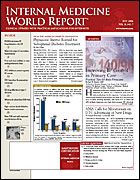Publication
Article
Internal Medicine World Report
Can Weight Loss After Bariatric Surgery Harm Bone?
Author(s):
From The American Diabetes Association
WASHINGTON, DC—Although bariatric surgery may confer multiple benefits beyond a dramatic weight loss, the procedure may compromise bone health, according to data released at the 66th Scientific Sessions of the American Diabetes Association.
“Weight loss after bariatric surgery results in substantial improvements in overall health, including serum glucose and lipid homeostasis,” said Robert Considine, PhD, associate professor of medicine, Indiana University School of Medicine, Indianapolis. “However, weight loss is also associated with significant increases in circulating markers of bone turnover in both men and women.”
His group examined the effect of weight loss on serum markers of bone turnover in 10 premenopausal women and 10 middle-aged men before and 6 months after laparoscopic Roux-en-Y gastric bypass surgery.
Arch Surg
“Bariatric surgery is one of the few obesity treatments that has been shown to maintain effectiveness over the long-term,” Dr Considine observed (. 2006;141:71-74).
JAMA
A study involving >22,000 patients showed that bariatric surgery was associated with significant reductions in body mass index (BMI) and excess body weight as well as improvements in comorbid conditions, such as hyperlipidemia, hypertension, type 2 diabetes, and sleep apnea (. 2004;292:1724-1737).
Because population-adjusted rates of bariatric surgery increased >7-fold from 1996 to 2002, it is imperative that long-term effects of the significant weight loss associated with bariatric surgery be investigated, Dr Considine noted.
In this trial, serum osteocalcin, bone-specific alkaline phosphatase (BAP), and N-telopeptide cross-linked collagen type 1 (NTX) were measured. At 6 months postsurgery, BMI levels decreased by 31.0% in men and 32.4% ± 1.6% in women.
P
P
P
A significant increase in serum osteocalcin (6.87 vs 10.87 ng/mL; <.001), BAP (14.16 vs 16.43 ng/mL; = .04), and NTX (10.91 vs 19.62 nM BCE; <.001) occurred in the entire group. The magnitude of the increase in bone markers was similar for men and women.
P
P
P
P
Circulating levels of calcium, phosphate, and parathyroid hormone were unchanged at 6 months after weight loss. Weight loss was associated with a significant reduction in serum glucose compared with baseline (102 vs 86 mg/dL; = .02), triglycerides (176 vs 88 mg/dL; <.001), total cholesterol (186 vs 152 mg/ dL; = .002), and low-density lipoprotein cholesterol (125 vs 95 mg/dL; = .006).
“We don’t know yet whether the increase in serum markers of bone turnover after bariatric surgery has clinical consequences,” Dr Considine said. “If we find in a longer follow-up that bone loss continues, we may be triggering a process that leads to osteoporosis. And this could be a particular problem in females, who constitute the majority of patients undergoing bariatric surgery and who are at increased risk of osteoporosis with aging.”





